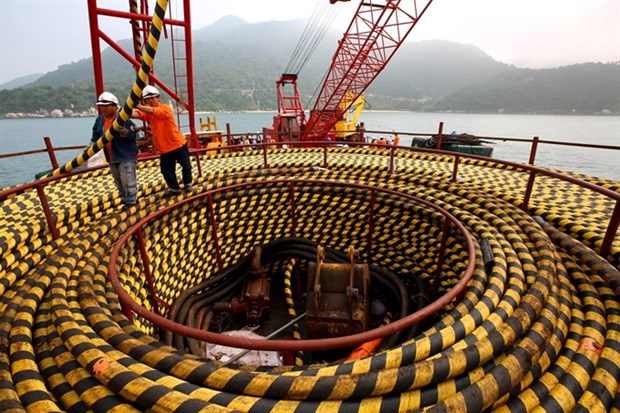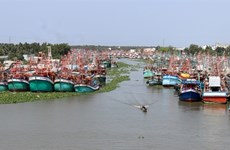Challenge for panel on state firms
The Government's establishment of a special committee to manage capital at State-owned enterprises (SOEs) is necessary, but it is likely to face significant challenges in its work, experts said.
 Electricity of Vietnam engineers install a cable in central Quảng Nam Province. The Government plans to establish a special committee to manage State capital in various areas, seeing this as essential in regulating the economy. (Photo: VNA)
Electricity of Vietnam engineers install a cable in central Quảng Nam Province. The Government plans to establish a special committee to manage State capital in various areas, seeing this as essential in regulating the economy. (Photo: VNA)Hanoi (VNA) - The Government's establishment of a special committee to manage capital at State-owned enterprises (SOEs) is necessary, but it is likely to face significant challenges in its work, experts said.
The Ministry of Planning and Investment (MPI) has drafted a decree on the establishment of the committee, which will help remove conflicts among State functions by separating State ownership performance from policy making and market regulation.
Official data released earlier this year showed that companies wholly owned by the State or in which it has a major stake have a combined asset value of about 5 quadrillion VND, or 222.2 billion USD. These companies are currently administered by ministries and sectors.
According to the draft decree, ministries and provincial or municipal people's committees are to transfer the ownership of 30 SOEs in various areas soon, such as in electricity, oil and gas, aviation and maritime and telecommunications, to the special committee.
The 30 companies reportedly account for more than 80 percent of the total value of State capital and assets.
The special committee will be regulated by the law on management and use of State capital at enterprises, with three major tasks:
- Monitor and assess investment capital and asset portfolios of the State in companies; and analyse and forecast the market situation for State investments.
- Perform all rights of State ownership in the role of an owner or a shareholder in companies.
- Advise the Government and the Prime Minister on using and managing capital for production and business activities of enterprises.
Nguyen Dinh Cung, Director of the Central Institute for Economic Management, told reporters in June that the committee would operate like a business, and its establishment plan was scheduled to be discussed in the National Assembly in the third quarter of this year.
Minister of Planning and Investment Nguyen Chi Dung told a HCM City law newspaper that such a committee was necessary to handle weaknesses in State management mechanisms for businesses.
Ministries and sectors currently perform the rights of ownership in enterprises, but they are not responsible for the business results. This led to inefficient use of State capital and assets, he said.
Nguyen Hoang Hai, Vice Chairman of the Vietnam Association of Financial Investors, said the newly drafted decree was "full of practicality".
It would enable ministries and sectors to "give their whole minds" to State management affairs, and a single committee would find it easier to supervise SOE operations, he told Vietnam Economic Times.
However, Hai said ministries and sectors might delay passing SOEs to the committee, like they did with the State Capital Investment Corporation (SCIC), for certain interests.
The SCIC, a strategic investment arm of the Government, was established more than 10 years ago to manage State interests in companies and projects. But ministries and sectors still assume a dominant role in administering State utility firms.
"Without drastic action, there is a possibility that very few SOEs will be transferred from ministries and sectors to the committee, even dozens of years after the decree takes effect," Hai said.
Le Dang Doanh, former director of the Central Institute for Economic Management, agreed that it would not be easy to detach SOEs from the governance of ministries since economic groups and corporations were considered "a big pot of rice" for them.
He said besides building the committee, the best way to promote the operational efficiency of SOEs was to accelerate their equitisation process.-VNA












